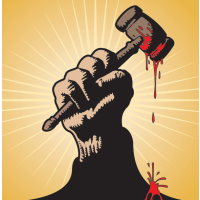Elected Judges more likely to Impose Death Penalty than Appointed Judges

How a judge reaches and stays on the bench has an impact on the most important of judicial rulings: death penalty cases.
An analysis of more than 2,100 state supreme court rulings from 37 states during the past 15 years revealed “a strong correlation between the results in those cases and the way each state chooses its justices,” Reuters reported.
The study shows that judges who are elected to the bench are more than twice as likely to rule in favor of the death penalty as judges who have been appointed. The findings suggest that politics factors into life-and-death decisions made for defendants in criminal justice cases.
In 15 of the states Reuters examined that directly elect their supreme court justices, those justices rejected the death sentence in 11% of appeals. That rate was far lower than the 26% reversal rate in the seven states where justices are appointed.
Another group of 15 states that initially appoint their justices but then require them to go through retention elections to remain on the bench produced a 15% reversal rate in death penalty decisions.
The influence of politics and fundraising by judges campaigning to be elected absolutely has an influence on judicial rulings, according to a recently published paper that focuses on the North Carolina Supreme Court. “What would happen if you had a judicial system where judges did not have to raise campaign money from lawyers and clients who had business before the court?,” asked Vox’s Lee Drutman, referring to the conclusion reached by the paper. “The answer, it turns out, is pretty much what common sense would dictate: You'd get justices who were more impartial, and less likely to vote in favor of attorneys who donated to their campaigns.”
“In addition to finding evidence that justices who opted in to public financing became ‘relatively less favorable toward attorney donors,’ the paper also shows that justices who opted in to the public funding system became more moderate in their voting patterns,” continued Drutman. “Unfortunately, North Carolina did away with this public funding system in 2013…”
As far as the Reuters study goes, its “findings, several legal experts said, support the argument that the death penalty is arbitrary and unconstitutional because politics – in addition to the facts – influence the outcome of an appeal,” Reuters’ Dan Levine and Kristina Cooke wrote.
They also cited the opinion of Yale Law School lecturer Stephen Bright, who has worked on hundreds of death penalty case defenses. According to Bright, “courts have a responsibility to protect a defendant’s constitutional rights without political pressure, especially when the person’s life is at stake,” wrote Levine and Cooke. Said Bright: “It’s the difference between the rule of law and the rule of the mob.”
-Danny Biederman, Noel Brinkerhoff
To Learn More:
In States with Elected High Court Judges, a Harder Line on Capital Punishment (by Dan Levine and Kristina Cooke, Reuters)
Public Financing of Judicial Elections Worked. Too Bad North Carolina Ditched the System. (by Lee Drutman, Vox)
Review of 2015 Efforts To Change, Alter, or End Merit Selection/Commission Based Judicial Appointment Systems (by Bill Raftery, Gavel to Gavel)
Alabama Judges Override Juries and Order Death Sentences…if There’s an Election Coming Up (by Danny Biederman and Noel Brinkerhoff, AllGov)
More Evidence that TV Ads in Judicial Elections Lead to Less Sympathy for Defendants back in the Courtroom (by Noel Brinkerhoff, AllGov)
- Top Stories
- Unusual News
- Where is the Money Going?
- Controversies
- U.S. and the World
- Appointments and Resignations
- Latest News
- Trump Orders ICE and Border Patrol to Kill More Protestors
- Trump Renames National Football League National Trump League
- Trump to Stop Deportations If…
- Trump Denounces World Series
- What If China Invaded the United States?






Comments